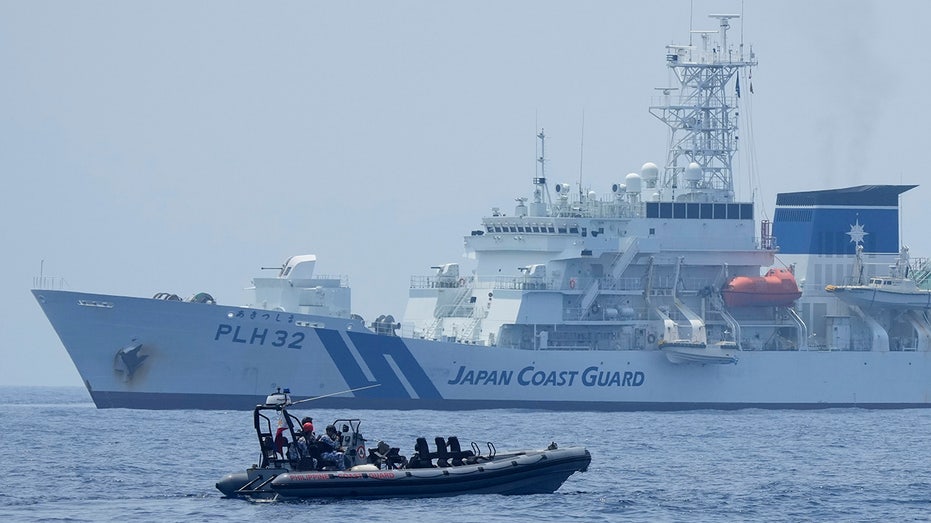US, Japan and Australia to conduct joint military drills in disputed South China Sea: report
The United States, Australia and Japan reportedly are to conduct joint drills in the South China Sea in a show of support for the Philippines this week.

Philippines officials reportedly revealed Sunday that the United States, Japan and Australia are gearing up to conduct joint military drills in the disputed South China Sea this week.
The move, which will include three aircraft and helicopter carriers sailing together in a show of force and undertaking joint drills, is meant to underscore the three countries' commitment to the rule of law in the region after a recent show of Chinese aggression in the disputed waters, two Filipino security officials, who spoke on condition of anonymity because they are not allowed to publicly discuss details of the planned drills, told the Associated Press. Their commanders are set to meet with Filipino counterparts in Manila after the offshore drills.
The U.S. plans to deploy an aircraft carrier, the USS America, while Japan would send one of its biggest warships, the helicopter carrier JS Izumo. The Royal Australian Navy would send its HMAS Canberra, which also carries helicopters, one of the two officials told the AP, adding that the joint drill was planned a few months ago.
The Philippines would not be part of this week's drills due to military logistical limitations but is open to becoming a participant in the future, the official said.
The White House shared a join-statement from Camp David Friday between the U.S., Japan and South Korea that, among other topics, condemns the "dangerous and aggressive behavior supporting unlawful maritime claims that we have recently witnessed by the People’s Republic of China (PRC) in the South China Sea."
"We strongly oppose any unilateral attempts to change the status quo in the waters of the Indo-Pacific," the statement said. "In particular, we steadfastly oppose the militarization of reclaimed features; the dangerous use of coast guard and maritime militia vessels; and coercive activities. In addition, we are concerned about illegal, unreported, and unregulated fishing. We reiterate our firm commitment to international law, including the freedom of navigation and overflight, as reflected in the UN Convention on the Law of the Sea (UNCLOS)."
"We reaffirm the importance of peace and stability across the Taiwan Strait as an indispensable element of security and prosperity in the international community. There is no change in our basic positions on Taiwan, and we call for a peaceful resolution of cross-Strait issues."
The drills this week come after Philippine officials said six Chinese coast guard ships and two militia vessels blocked two Philippine navy-chartered civilian boats taking supplies to the Philippine forces stationed at the Second Thomas Shoal on Aug. 5. One supply boat was hit with a powerful water cannon by the Chinese coast guard while the other managed to deliver food, water, fuel and other supplies to the Filipino forces guarding the shoal, the Philippine military said.
The U.S., Japan and Australia were among several countries that immediately expressed support for the Philippines and concern over the Chinese action following the tense stand-off.
The Chinese coast guard acknowledged its ships used water cannons against the Philippine vessels, which it said strayed without permission into the shoal, which Beijing calls Ren’ai Jiao.
"In order to avoid direct blocking and collisions when repeated warnings were ineffective, water cannons were used as a warning. The on-site operation was professional and restrained, which is beyond reproach," the Chinese coast guard said. "China will continue to take necessary measures to firmly safeguard its territorial sovereignty."
The Philippine military said on Saturday that it would again attempt to deliver basic supplies to its forces in the Second Thomas Shoal, but didn't provide further details. The mission "is a clear demonstration of our resolve to stand up against threats and coercion and our commitment in upholding the rule of law," the Armed Forces of the Philippines said.
Following the incident earlier this month, Washington renewed a warning that it is obliged to defend its longtime treaty ally if Philippine public vessels and forces come under armed attack, including in the South China Sea.
Meanwhile, the AP reported, citing satellite photos just days ago, that China appears to be constructing an airstrip on a disputed South China Sea island that is also claimed by Vietnam and Taiwan. The work on Triton island in the Paracel group mirrors construction on seven human-made islands in the Spratly group to the east which have been equipped with airstrips, docks and military systems, although it currently appears to be somewhat more modest in scale.
China claims virtually the entire South China Sea as its own, denying the claims of others and defying an international ruling invalidating its assertion.
The Associated Press contributed to this report.






















